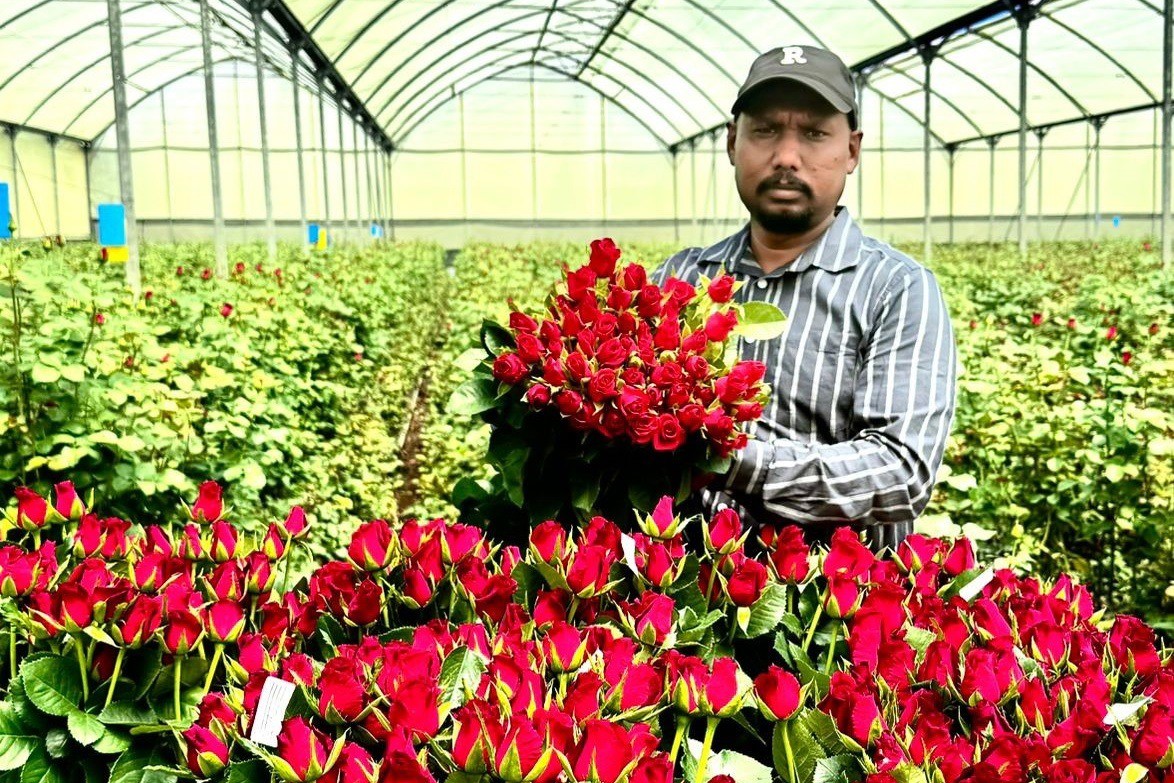
In the floriculture industry, choosing the wrong variety can be costly for growers, making trust and precision in breeding essential to the relationship between breeder and grower. At the IFTEX 2025, rose breeding took center stage in stakeholder interactions as the industry sought sustainable premium varieties.
Among the breeders that stood out at the expo was De Ruiter East Africa Ltd.
“We do not just breed roses, we breed trust,” says Rob Letcher, the Managing Director.
A global giant with its headquarters in the Netherlands and operations in China, Colombia, Ecuador, and Kenya, De Ruiter has been shaping the floriculture industry for over 100 years.
“De Ruiter East Africa Ltd, with the head office in Naivasha, is the main hub for African operations,” says Letcher.
Speaking on the company’s strong presence across the continent, Rohit Patel, the Sales and Marketing Manager, says, “We receive a lot of inquiries from West Africa (Angola, Cameroon, Ghana, Nigeria, The Gambia) North Africa.”
Letcher shares that to stay ahead of the competition, De Ruiter has to be innovative in its breeding practices.
“To come up to commercialization, any variety takes a minimum of between six to seven years,” he says, adding that “innovation in breeding is a painstaking but precise art.”
Sales and Marketing Manager Rohit Patel explains that to ensure only premium-quality varieties reach the market, De Ruiter relies on an internal team that conducts both broad and highly critical selection processes.
“For example, we have an operations team and two separate commercial teams that each conduct their selections. In the end, we come together to review and discuss any issues that raise questions,” he says.
Speaking on the role of trial and market data, Ethan Chege, Sales and Technical Manager at De Ruiter, says, “We want to have market information that helps the grower make the right selection.”
“The cost of a wrong selection is 100,000 euros plus or minus. It’s huge,” says Letcher.



Rohit says that understanding market dynamics has been crucial to the development and launch of their new red variety, Revolution®, introduced alongside their well-known Ever Red®.
“We’re promoting that variety for retail growers, potentially lower-end wholesale as well,” he adds.
Commending the turnout at IFTEX 2025, Rohit notes that engaging with global industry stakeholders has offered valuable market insights, as it brings growers and other players along the value chain together under one roof to exchange ideas.
Highlighting the emerging markets, he points out the increasing demand in the Middle East for strong colors, red, white and pink.


“Ever Red® remains a strong performer, while Proud® is a popular white variety in that market, and Mandala®, a pink variety, is also showing promising development,” he adds.
Emphasizing the global stature of the expo, Letcher says,
“We’ve interacted with Ukrainian buyers, Russian buyers, and buyers from Kazakhstan.”
Moreover, Sales and Technical Manager, Ethan, says these interactions help understand the evolving buyer preferences, like color, head size, and quality.
“All these things are important because they’re changing constantly. It’s a dynamic market,” he says. “Red Calypso® performed well before, but the head size on that variety now is too small for most markets,” he adds.
“Trends change. So must our roses,” emphasizes the MD, Letcher.
To stay aligned with evolving market trends, De Ruiter has made sustainability a core priority in its breeding program.
“We are continuously improving our varieties, in response to sustainability concerns, to be less dependent on sprays and chemical applications,” says Letcher. He further adds that reducing vulnerability to pests and diseases leads to less chemical use throughout the growth cycle.
“We will be able to get varieties that demand very little, if any, chemical use, for example, because they will be able to resist the upcoming pest and disease infections,” adds.
Rohit also says De Ruiter is at the forefront of creating sustainability in the industry, saying, “Innovation, creating new varieties, has been for many, many years…our core business, to make sure we bring the most admirable flower to the consumer.”
Despite the challenges facing the industry, Letcher emphasizes that patience is essential to developing the optimal variety
“Sampling and trials are important before commercial planting,” he says, adding, “I always suggest growers do trials first before planting. Always.”
Highlighting the importance of meeting market demand, Rohit says, “Before planting any variety, we encourage growers to test it with their market, send samples to buyers first, because the final decision ultimately depends on market demand.”
“Be patient. Varieties are coming, growers are trialing them, and it’s a lengthy process,” Letcher says, adding, “We’ve been breeding for over a century, and we’re just getting started.”
